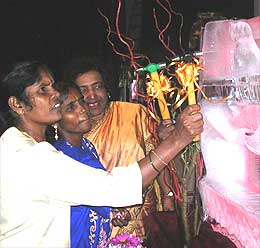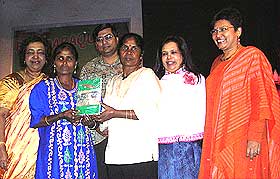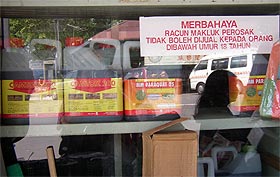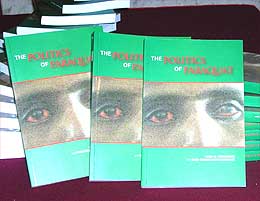BAN the use of paraquat - that's the clarion call by two non-governmental organisations at a book-launching event in Kuala Lumpur last Sunday.
The reason - paraquat is a toxic herbicide which is deemed as dangerous and had caused severe injuries to workers who used it.
 The book, aptly titled
The Politics of Paraquat
, was jointly launched by workers rights group Tenaganita and Pesticide Action Network Asia and the Pacific (PAN AP) in a Sunday morning affair at a Kuala Lumpur hotel.
The book, aptly titled
The Politics of Paraquat
, was jointly launched by workers rights group Tenaganita and Pesticide Action Network Asia and the Pacific (PAN AP) in a Sunday morning affair at a Kuala Lumpur hotel.
Speaking at the event, Tenaganita director Irene Fernandez said "it appeared that economic considerations on the part of the government, related to the 'cost effectiveness' of paraquat, had superceded concerns over its well-known hazards."
Paraquat is a deadly poison that is widely used in agriculture to control weeds but it also poses serious hazards to humans which included lung damage, skin lesions, dermatitis and nose bleeds. Its use in the United States is restricted because of its high level of toxicity.
Problems due to paraquat exposure are being seen in farms and plantations worldwide. In Malaysia, the herbicide has been a major cause of concern due to continued poisoning suffered especially by women who worked as pesticides sprayers.
Fernandez said it was indeed sad that in Malaysia, there is no control over the use of paraquat.
 The greatest risks to workers using the herbicide are during mixing and loading of spray equipment where contact with the concentrated chemical occurred.
The greatest risks to workers using the herbicide are during mixing and loading of spray equipment where contact with the concentrated chemical occurred.
Totally no control
There have been cases of women handling paraquat who suffered from miscarriages. Recently, there were two cases of severe injuries due to paraquat where one of them lost one eye and another suffered from internal complications.
"There is no specific mechanisms to monitor the usage of paraquat - there is totally no control at all," she noted.
 Fernandez highlighted that the paraquat case and the struggle of the women workers for safe working conditions is just one dimension of the overall plight of workers in the high value plantation sector in Malaysia.
Fernandez highlighted that the paraquat case and the struggle of the women workers for safe working conditions is just one dimension of the overall plight of workers in the high value plantation sector in Malaysia.
The Politics of Paraquat by Josie M Fernandez and Rash Behari Bhattacharjee started with the story of the plight of pesticide sprayers in Malaysia's plantations, describing their powerlessness against the political and economic influence of corporations.
The book, in five chapters, detailed the use of paraquat to earn maximum profit and power, battle against paraquat and corporate social responsibility.
 "It aims to awaken the conscience of its readers to the harm that is being done to farmers and agriculture workers, especially in hot, humid climates, where the use of protective equipment for spraying paraquat is impractical," Josie said in her foreword for the book.
"It aims to awaken the conscience of its readers to the harm that is being done to farmers and agriculture workers, especially in hot, humid climates, where the use of protective equipment for spraying paraquat is impractical," Josie said in her foreword for the book.
She elaborated that the book also confronted the unethical arguments used by Syngenta - a leading producer of paraquat based in Switzerland and parties with vested interest in commercial agriculture to extend the use of this highly toxic herbicide.
The Politics of Paraquat is obtainable at Tenaganita office in Kuala Lumpur or Pesticide Action Network Asia and the Pacific office in Penang. It is priced at RM34.90.
WONG YEEN FERN is a member of the malaysiakini team.

